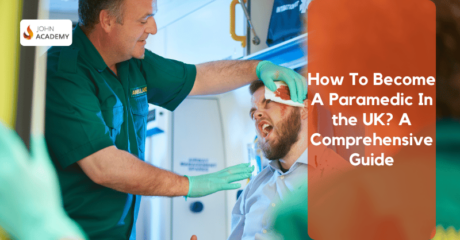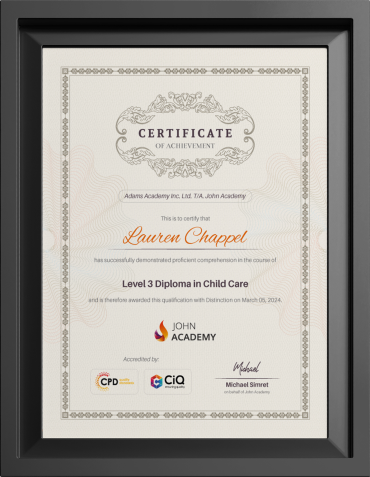
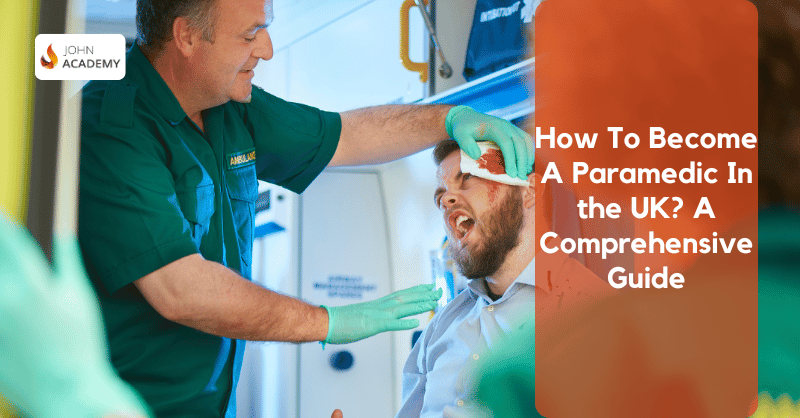
Not all heroes wear capes. A paramedic is among those capeless heroes who save lives every day. They are the first responders in case of medical emergencies. Therefore, they take the most crucial treatment phase. The job of a paramedic may be hard and stressful, but it offers great satisfaction. If you are looking forward to a career where you can help people at a difficult time and save lives, becoming a paramedic is ideal. So, buckle up and learn how to become a paramedic with us!
Table of Contents
What is the Role of a Paramedic?
A paramedic is a medical professional who provides the initial treatment to an ill or injured person. They are the ones who decide if the person needs to be taken to the hospital or not. In addition, on the way to the hospital, they keep the patient stable. They make sure patients receive the required attention till they reach the hospital. Hence, they play a vital role in saving the person’s life.
The roles of paramedics are diverse. From patient care to ambulance maintenance, they have to fill a wide range of responsibilities. Here is a list of the major duties of a paramedic.
- Responding to emergency calls
- Conducting an assessment of the patient and gathering details from the witnesses
- Reviving the patient
- Taking measurements to prevent haemorrhaging
- Giving medicines, CPR or other treatment according to the needs of the patient’s condition
- Deciding if the patient needs to be admitted to the hospital
- Taking the essential steps to keep the patient stabilised while taking to the hospital
- Operating and maintaining the equipments in the ambulance
- Maintaining records and making reports
- Ensuring all legal guidelines and medical protocols are followed
What are the Roles Paramedics Can Specialise in?
There are different types of paramedics who specialise in different areas. Each role requires different qualifications, knowledge, and expertise. Here is a list of some of the categories of paramedics.
Air Ambulance Paramedic
Air ambulance paramedics provide services through helicopters. They are capable of more advanced levels of doctor-led medical procedures.
Seafarer Paramedics
The paramedics who work on ships, cruises, coastguards, etc, are the seafarer paramedics. These paramedics are vital for ships or water vessels that travel long distances.
Event Paramedic
Event paramedics are those who provide services in different types of events or mass gatherings. For example, festivals, concerts, sporting events etc.
Offshore Paramedic
Offshore paramedics work in offshore platforms such as oil rigs, support vessels, etc. Generally, they are capable of dealing with a wide range of medical emergencies.
Paramedic Practitioner
Paramedic practitioners are highly skilled professionals capable of making autonomous decisions. They work with GPs and community health care.
Senior Paramedic Team Leader
Senior paramedic team leaders are responsible for overseeing the team operations. They ensure quality patient care, coordinate emergency response and more. These professionals with leadership positions are an important part of the medical care.
How to Become a Paramedic?
In order to become a paramedic, you will have to fulfil a few requirements. We have prepared a list of things you have to do before you can start working as a paramedic.
Qualification
How to become a paramedic? The key task is to register with the Health and Care Professions Council (HCPC). There are two ways you can do that.
- Undergraduate Degree
- Work as a Student Paramedic
Get an Undergraduate Degree
The first and recommended process is taking an undergraduate degree in paramedic sciences. The degree must be approved by the Health and Care Professions Council (HCPC). Undergraduate degrees can take 3–4 years to complete. Each university has its own set of requirements. Therefore, check the requirements before you apply for your chosen university.

Generally, to enrol in an undergraduate paramedic science degree, you will need two or three A-levels along with a science. In addition, you will require five GCSEs at grade C or above. These five should include English, Maths, and Science. If you do not have these qualifications, you can opt for other equivalent qualifications as well. For example, a relevant T level or a relevant NVQ.
Work as a Student Paramedic
The second process is working as a student paramedic. A student paramedic is someone who works with an ambulance service trust while studying. It is like an apprenticeship where you will get work experience along with your study. However, this is a competitive process. Also, each NHS ambulance service trust has different requirements.
Usually, you will need five GCSEs, including English, Maths and Science, with grades C or above or any other equivalent qualifications. Along with that, you will require two years of driving experience. Good physical fitness is also an important aspect. You will have to go through interviews, fitness assessments and driving tests. Once you have cleared all the stages, you will get the apprenticeship.
Other than these two paths, one more path is open for you if you are a nurse, midwife or any other allied healthcare professional. To register as a paramedic, you must take a level-7 MSc pre-registration course.
Experience
It might seem difficult to gather experience before you start working as a paramedic. However, there are many ways through which you can gain experience in this field. You can work as a volunteer in organisations such as St John Ambulance, St Andrew’s First Aid and British Red Cross. This will provide you with a first-hand experience of the services and duties of a paramedic. In addition, this work will add significant weight to your resume.
You can also gain experience by volunteering as a community first responder affiliated with local ambulance services. This is an excellent way to develop practical skills and improve your abilities. In addition, working in a resident care home, working with sick or disabled individuals, and taking first aid training are good opportunities to gain relevant experience.
Certifications
Along with the required qualifications, there are a few more other certificates as well. In order to start a career as a paramedic, you should get these certifications.
First Aid Training Certificate
First aid training is vital in primary care. Acquiring a certificate in first aid training also increases the value of your CV. You can take first aid training and earn a certificate in the institution you are studying. There are also other training programs available. You can join courses offered by British Red Cross or St. John Ambulance.
Enhanced Criminal Record Certificate
Paramedics deal with vulnerable young and adults. Paramedics must go through an enhanced criminal record check. It is to ensure the safety of the patients. In Wales and England, aspiring paramedics should take the Disclosure and Barring Service (DBS). For Scotland, it’s the Protecting Vulnerable Groups (PVG) scheme. In Northern Ireland, it’s AccessNI. If you have a criminal history, it may impact your employment as a paramedic.
C1 Driving License
As a paramedic, driving the ambulance is one of the key roles you have to play. However, you will need a C1 driving license for that. To get this licence, you must pass the driving course. Once you pass the course, you need to acquire at least a year of driving experience. In the meantime, you also need a Category B licence.
Employment
Once you have completed the qualification, it’s time to look for a job.
The best place to look for paramedic jobs is on the official NHS job websites. Here, you will find job listings for paramedics. Also, you may want to learn about the ambulance service vacancies for different regions.
In addition, every NHS ambulance service trust in the UK has its own recruitment website. You can find information about the requirements for the position on their websites. Each organisation has their own requirements. So make sure to check them out before applying.
Along with the required qualifications, adding additional certifications will elevate your resume. You can take online or offline training courses accredited by recognised awarding bodies. If you are opting for online training, you can take courses from John Academy. These are CPDQS-accredited and self-paced trainings.
How is the Working Environment for Paramedics?
There are no fixed work settings for the paramedics. From roadside pavements to inside the homes, paramedics deliver services wherever they are needed. Paramedics usually work in high-stress work environments as they deal with a crucial treatment phase. In addition, there are many risks associated with their work. Especially when they are working with contagious diseases.
Also, paramedics work on shifts. Throughout the shift, they have to stay alert for any emergency calls and get there as soon as possible. These shifts can last from 12–24 hours. However, there are usually long breaks for when they are working a 24-hour shift.
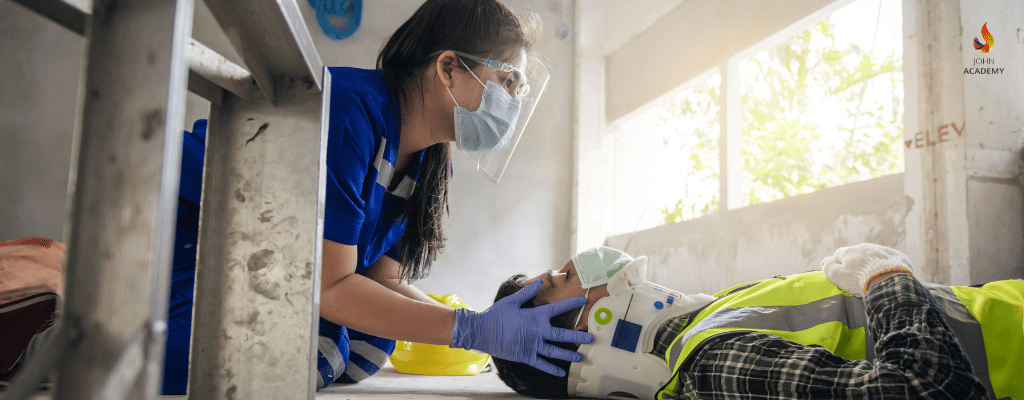
How Much Do Paramedics Earn?
The paramedics receive their salaries according to the NHS Agenda for Change pay scales. At the start of their career, paramedics can earn around £25,655 to £31,534 annually, which is at band 5. After working for two years and acquiring experience, the salary range will go to band 6. At band 6, the salary is around £32,306 and £39,027.
Paramedics in senior positions or who are team leaders may receive a 6-7 band salary. Their scale is higher due to their advanced training and experience in critical care or trauma. In addition, after working for a year, paramedics in GP care or primary care can earn at brand 7.
What Facilities Do Paramedics Get?
Along with their salaries, there are other benefits allocated for paramedics. These benefits include the following:
- There are 27 annual leaves provided to the paramedics. This number can vary depending on a few factors, such as hours worked, extra hours worked, etc.
- There is an NHS pension scheme, which is based on a final salary program. This scheme pays based on the average salary earned in the total working life.
- Paramedics get access to NHS discounts.
- They can take study leave for training and other career development programs.
- Paramedics also have access to physiotherapy and counselling services.
- There are relocation packages for those who are eligible for it.
Are There Any Study Grants for Student Paramedics?
In order to make it easy and affordable for the students, the NHS provides financial support to student paramedics. You could get at least £5,000 of funding each year. In addition, the eligible student can get an extra £3,000. You will not have to repay the money. On top of that, you can still get grants for tuition and maintenance loans from the Student Loans Company.
What Skills Do You Need to Become a Paramedic?
The job of a paramedic is not easy. Along with the right qualifications, you will need some extra skills. These skills play a significant role in making them more proficient. Do you want to know what are these skills? Have a look.
Medical Knowledge
Acquiring medical knowledge is the key to providing proper treatment. Thus, paramedics must have an elaborate understanding of medical conditions, symptoms, and treatment. They should also know how to use common medical equipment like defibrillators, IVs etc. In addition, they must stay up to date with the recent developments in the medical sector. The more time they spend enhancing their knowledge, the better service they can provide.
Communication Skills
While working, paramedics need to communicate with a wide range of people. For example, teammates, patients, witnesses, doctors and more. In addition, they have to pick up emergency calls and figure out what the emergency is. Thus, it is important to have good communication skills. They must be able to express themselves clearly and also listen to the patients and others.
Teamwork
Providing emergency care is not a one-man job. There are many tasks that require good teamwork. For example, transporting the patient while keeping them stable or determining the course of action. Therefore, working as a team and maintaining good relationships with co-workers is important.
Remaining Calm in Stressful Situations
When you are a paramedic, you have to deal with stressful situations almost every day. Staying calm in these situations is vital as it is the first requirement to make the right decision. Hence, paramedics should know how to keep cool and perform their duties.
Also, it is important to prevent the patient from panicking in high-stress situations. As a paramedic, you must not stress out or show any signs of panic to keep them calm. Therefore, stress management is an essential skill for becoming a paramedic.
Sensitivity and Compassion
Sensitivity and compassion are pivotal for dealing with a situation where a person is in shock and pain. As a paramedic, you have to have the ability to show compassion and calm the patient.
You must talk with patience and encourage them to stay positive. This is not only for the patient but also for the family members as well. Like the patient, the family members or friends can panic. Therefore, it is crucial to empathise with them and describe the course of action.
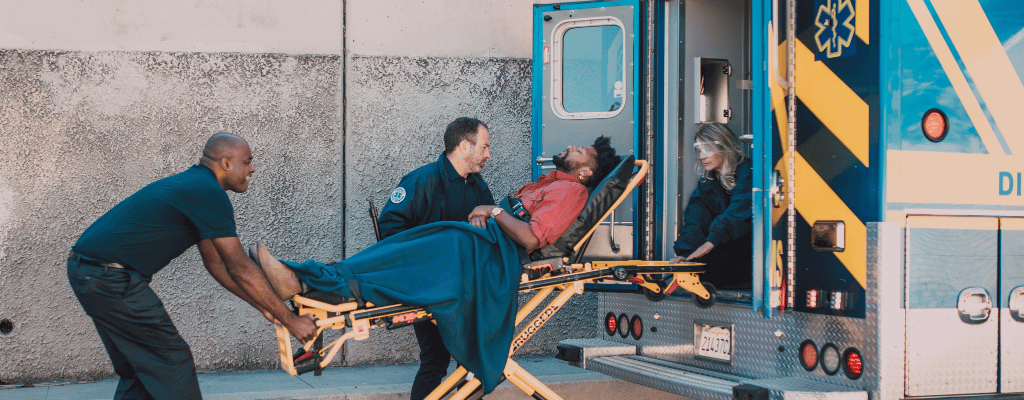
Physical Abilities
It requires both physical and mental strength to take care of people in medical emergencies. As you have to keep your mind cool, you also have to keep your body fit. There are many situations where a paramedic has to carry patients or heavy medical equipment. In addition, they have long and stressful shifts which require a lot of stamina. Therefore, paramedics must be in a good physical condition.
Basic Computer Skills
Paramedics are responsible for keeping the records of the patients and making reports. Usually, the organisation provides software, where they have to keep track. That is why paramedics need basic computer skills. They should know how to input the data and make the reports with the help of the software.
Driving
Excellent driving and navigation skills are highly valuable for paramedics. It is their duty to reach the place of the incident as soon as possible without breaking any traffic laws. Thus, good driving skills are mandatory to reach the science without wasting time. Moreover, navigation skills allow them to understand the direction and successfully locate the scene.
Career Development for Paramedics
A paramedic can acquire a more senior position after gaining experience and further training in this field. You can become a senior team leader. As a team leader, you will supervise other paramedics and care assistants. As you climb up the ladder, your role and responsibilities will increase as well. Therefore, it is important to keep working on yourself and increase your expertise.
You can take the Paramedic Training course by John Academy to enhance your skills. This accredited course will provide you with quality training and help you polish up your knowledge.
Once you become a senior paramedic, you can work as an emergency care practitioner. You can work in emergency care at community hospitals, GP surgeries or health centres. With further training in critical care and trauma, you can opt for a senior position in critical care.
If you wish, you can specialise in a certain area. For instance, air ambulance paramedic, offshore paramedic, etc. However, specialised areas require different qualifications, skills and knowledge. Thus, you have to take specialised training to work as a specialised paramedic.
Conclusion
How to become a paramedic? Where to get the qualification or how much do they earn? Hope you have got all the answers to your questions. So, prepare yourself to embark on a new journey. Remember, the path may seem difficult and stressful at times, but the satisfaction from saving lives will make you forget it.
FAQ
It usually takes 3–4 years to become a paramedic, depending on the length of the course taken to be a paramedic.
The starting salary for a paramedic is around £25,655 per year. However, a seasoned professional can earn nearly £39,027 annually.
Paramedics have a higher level of training and are capable of more advanced medical procedures than EMTs.
You can become a paramedic without a paramedic science undergrad degree. For that, you have to join an apprenticeship with an ambulance service trust.
Yes, when you apply to become a student paramedic with an ambulance service, you must provide a valid driving licence. After completing your qualification, you will need a driving licence for employment.
You can find graduate paramedics or student paramedics vacancies on NHS jobs. In addition, each ambulance trust service puts up recruitment posts on their websites. You can look for jobs there as well.
